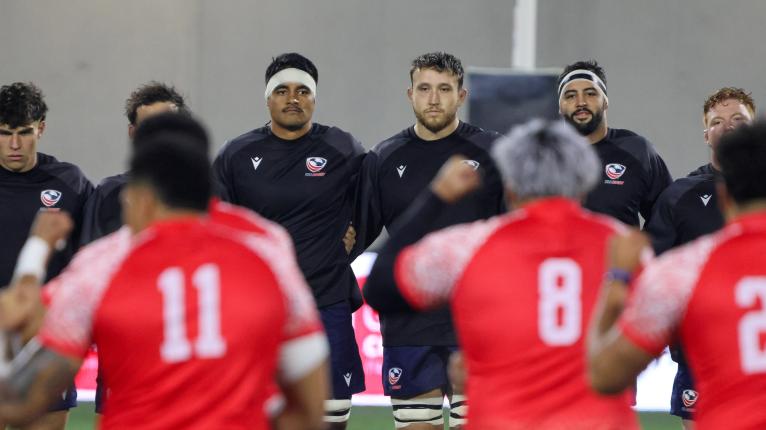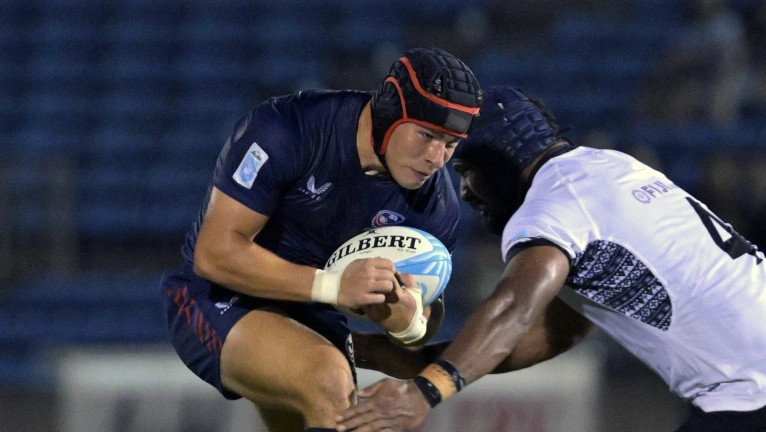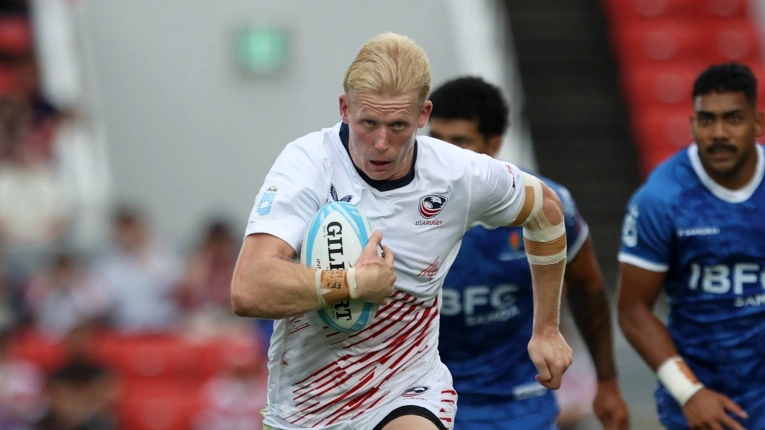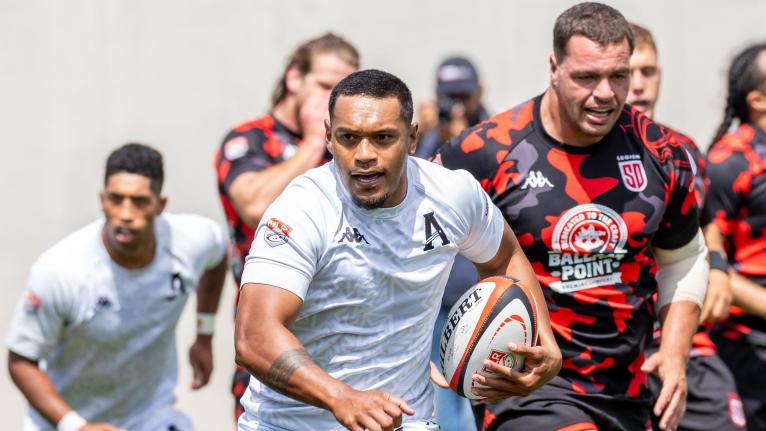‘Our country likes big visions’ – Scott Lawrence on USA’s World Cup mission

Inspired by America being the first country to put a man on the moon, US Eagles head coach Scott Lawrence is unashamedly shooting for the stars and targeting a Rugby World Cup quarter-final win on home soil in 2031.
Given that the Eagles have only ever won three matches in the entirety of their Rugby World Cup history, and missed out on the last tournament altogether, it’ll be a big ask to get the two wins they’ll most probably need to make it out of the pool stages, let alone progress any further.
This mission is being underpinned by Moonshot 2031, the project designed to elevate the Eagles into uncharted territory just like revered astronauts Neil Armstrong and Buzz Aldrin did back in 1969.
Former Eagles No.8 Lawrence wasn’t even born when history was rewritten, but the story of how America won the space race resonated with him when he came to theming the team’s attempt to become a world rugby powerhouse, hence the decision to break Moonshot 2031 into three stages – Project Mercury, Project Gemini and Project Apollo. Meanwhile, one of his grandma’s stories gave it an added family connection.
“In 1962, JFK gave a speech at Rice University that said the United States was going to go to the moon. We hadn’t even launched a rocket yet,” the 49-year-old pointed out.
“When you look at the space programme and you break it down into two things, firstly it was one of the biggest achievements in our country’s history and took hundreds of thousands of people to put those two men up.
“My grandmother told me a story about how she worked in the factory in Grand Rapids, Michigan, that produced the bolts that were on the Saturn rocket. She felt like she contributed to the space programme and was proud of that.
“And, secondly, the astronauts were the best that we could produce as a country at the time.

“For me, there are a lot of parallels between what we want to achieve. We hadn’t qualified for the last World Cup (in 2023) so to say we were going to make the quarter-finals in two World Cups’ time was going to take a lot and a lot of people to achieve it.
“For better or worse, the Eagles are the best that we can produce. As long as we begin to think of them in that way and they begin to think of themselves as being elite and having the weight of hundreds of thousands behind them, then we have got momentum, so it just kind of spoke to me a little bit, I guess.”
Larwence became head coach in May 2023, after Gary Gold failed to get the Eagles to the 2023 World Cup. Having served six months’ probation, he was handed the job full-time the following January.
The Moonshot programme was launched in this bridge-over period and the initial phase of the programme, Project Mercury, was all about establishing a firm base from which to build from, through putting the right infrastructure and people in place. Securing the United States Performance Centre in Charlotte, North Carolina as the Eagles’ permanent home was an excellent starting point for the mission.
Then it was onto 2024 and Project Gemini. In the space race sphere, Project Gemini’s objective was the development of space travel techniques to support the Apollo mission. Applying it to rugby, Lawrence identified the need to reinvigorate the U20s programme, establish the Eagles as an aspirational team that was attractive to play for, and build cohesion between both players and coaches.
Qualification for the World Rugby U20 Trophy was not only secured but the Junior All-Americans made it all the way to the final last July. While they were well beaten by hosts Scotland, losing 48-10, it was still the U20s best performance since Larence himself led the team to the title in 2012.
“We’re investing in 18 to 23-year-olds as that’s when players turn to a single sport, it’s when we can capture crossovers (players switching from other sports), it is more difficult to change skillsets and habits post-23,” he explained.
“We peeled out a member of the staff (South African Neethling Gericke) that focused purely on identification medium and long-term plans.”

The U20s showed plenty of grit and their goal-line defending was a standout feature of their play at Hive Stadium in Edinburgh, something which the Eagles mimicked in a solid if not unspectacular Pacific Nations Cup, in which the team finished fourth of the six teams. Defence coach Nick Easter, the former England No.8, was a key addition to the coaching team in this respect.
In November, the Eagles gained revenge on Portugal, the team that qualified for France 2023 in their place, with a 21-17 win at Estádio Municipal Cidade de Coimbra. Then it was off to France to play Tonga on neutral territory, with the Eagles achieving a 36-17 win. A 26-23 win over Spain in Madrid completed a clean sweep of victories and boosted Lawrence’s win record as head coach to 50% (P14, W7, L7). It was also the first time since 2019 that the Eagles had managed three wins on the bounce and the winning run elevated them back into the world’s top 15 ranked teams.
In the PNC, the Eagles were the joint-lowest try-scorers in the tournament (with eight) and conceded the most penalties (45). But in November, there were definite signs of progress as the team gravitated from one that simply set out to be hard to beat to one that challenged the opposition through its endeavours. Discipline was another area where there was a marked uplift in performance. After averaging 11.25 penalties per game at the PNC – the worst record in the tournament – they kept it down to just nine in November.
“We used 47 players across the nine games this year which gives you an idea of how much turnover we had as a squad each time we got together,” said Lawrence.
“We really focused on our mindset around discipline and we worked a lot on our technical accuracy in the contact area. Our dominant tackle percentage went up for the year.
“We looked into where we were playing and where we could apply pressure on the opposition.
“We got our foundations in place in defence in the previous part of the year and then we really started to zero in on the attack and hold onto the ball more, and strike and score.
“That’s when it started to come together for us, in November.
“I really credit that to the conditioning of the players and the amount of time they had together.
“If you do two things with American players – work them hard and give them confidence in their technical direction – they never have a problem fronting up they are always going to be physical.”

With three Tests lined up this July, as well as the Pacific Nations Cup – which doubles as a Rugby World Cup 2027 qualifying tournament – and a set of November internationals, the Eagles will have plenty of opportunities to put Lawrence’s playbook into practice and forge an even greater understanding of each other’s play. Meanwhile, with no U20 Trophy taking place, the U20s will go to South Africa to play some training games.
Away from the Test arena, current and future Eagles will use the embryonic Anthem franchise team as a vehicle to get more meaningful playing minutes under their belts.
The fully pro team was formed last year as a collaboration between Major League Rugby, US Rugby and World Rugby, and is designed to accelerate high-performance standards across the whole player pathway.
Results-wise, the team’s inaugural season in MLR ended without a single win from the 16 matches played in the Eastern Conference. Lawrence says there were mitigating factors and is confident of a better showing 12 months down the line.
“I think it was the timing of the introduction. You had a group of players thrown into a professional season two weeks before it started and the dispersal mechanism was stacked against the Anthem acquiring players. So I think it was a kind of a perfect storm,” he said.
“Now it is a year further on and there are 11 players in the Elite Player Squad with Anthem from the Eagles and a number of really good draft picks and we’ve also brought in Agustin Cavalieri, to strengthen the coaching team. He was head coach of Dallas Jackals and has previously worked with the Italian U20s, developing several players into senior internationals.
Anthem RC was born out of necessity because of the lack of playing time for American players across MLR, which as a privately-owned league does not have to meet any USA-qualified player criteria to access funding.
Men’s Eagles Captain, Greg Peterson ready for life after rugby.
Story ⤵️https://t.co/dixVI4HfCY
— USA Rugby (@USARugby) December 15, 2024
For Lawrence, fixing this problem is critical to the success of their overall mission. “What we need to do to increase the playing minutes for our players in MLR. Americans are playing about 36% of minutes in the league right now, and for certain positions that is much lower. In the number 10 position, for example, we only had 1% of the playing minutes.”
With AJ MacGinty, who Lawrence describes as a “generational” talent, soon to turn 35 and unlikely to make the next World Cup let alone 2031, there is a pressing need for a fly-half to come through the pathway and put pressure on players like Luke Carty.
“I was with our 18s and 20s last week, we had talent ID camps out in California, and there were 86 players in the group,” Lawrence was delighted to tell us.
“You’re always looking for the top 10% even within that group, and we are seeing a higher skillset that is coming into the pipeline in the US right now, particularly at U18 level.
“I have been going to those things for a number of years, and the skillset is becoming higher, the athletes are becoming better, their habits are improving.
“The talent is there it is just a matter now of getting them in the right daily training environments and making sure they are playing meaningful match minutes.”
By concentrating the best national talent at one club, Anthem RC is designed along the same lines as Argentina’s former Super Rugby outfit, Los Jaguares, and current Super Rugby Americas franchises, Peñarol (Uruguay) and Selknam (Chile). All three examples have benefitted the national team. Uruguay and Chile both qualified for the last World Cup, USA did not, and Argentina produced their best performance at last year’s Rugby Championship.
“You look at the South American teams from Chile and Uruguay, they do it really well. Upwards of 70% of the national players are at one of the clubs in Super Rugby Americas, and you’ve got Fijian Drua and Moane Pasifika in Super Rugby Pacific, so it is a pretty common model in this tier.”

In addition to Anthem, Lawrence hopes a handful of other MLR Teams will commit to recruiting home-grown talent.
“I think it is about concentrating the players that you do have and getting them together and building cohesion as much as possible,” he said.
“I think Anthem will also probably serve as a development focus, in that it takes on a lot of younger players and creates a learning environment where they can develop.
“Hopefully, they’ll stay long enough with the Anthem, but we want to see some of those players play in the MLR and get bigger contracts at other clubs.
“It is critical that we keep not only the Anthem but some like-minded franchises within the MLR, that are also trying to play some American minutes. We don’t have to boil the ocean there but we do need a core set of three or four clubs doing it.”
Accuse him of being on another planet if you will for believing the space-themed narrative will end up with a successful outcome, but Lawrence would love nothing more than to prove the cynics wrong and unlock the huge potential of US rugby on the game’s biggest stage.
“We’ve had a taste of what is needed and now it’s about putting the pieces together,” he said.
“For us as a union, this year is about going higher. Our country likes big visions and won’t be deterred by hurdles.”

To be first in line for Rugby World Cup 2027 Australia tickets, register your interest here





















































































I find it interesting that the United States’ goal at a World Cup is exactly the same as Ireland’s. A first quarter final win.
Again, apologies that Ireland beat SA so often.....
Your "Chemical Ali" predictions before the Durban Test are now comedy Gold!!!! 😉
The RWC 2031 race is on. Rooting for Namibia.